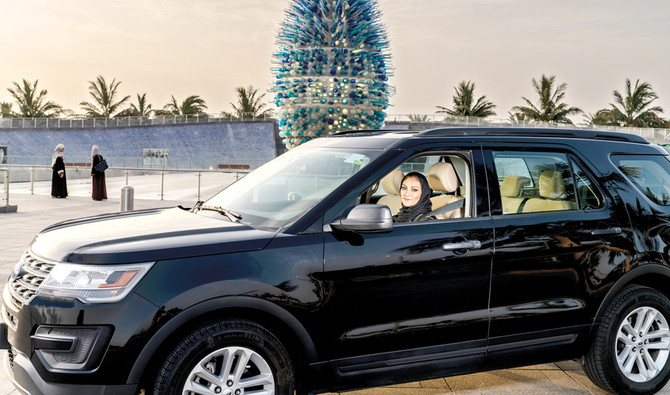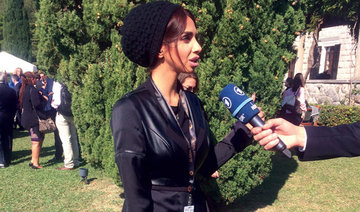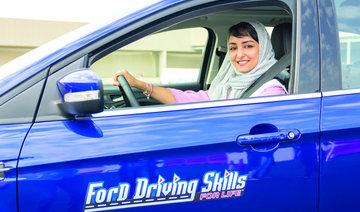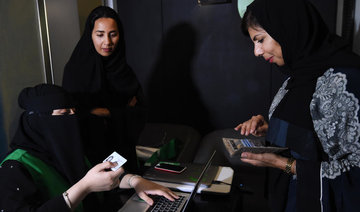JEDDAH: Saudi women preparing to drive in the Kingdom for the first time on Sunday might be surprised to learn that some have taken to the road already.
At institutes such as King Abdullah University of Science and Technology (KAUST) and Saudi Aramco, women have been issued driver’s permits by the special zone’s driving school.
Dr. Aala Abulfaraj, 37, drives at KAUST, where she is a research scientist in molecular biology and immunology, and an assistant professor in King Abdul Aziz University’s bioscience department.
Abulfaraj said the driving environment at KAUST is similar to that of European countries or the US.
“Everyone has to follow the rules and they are strict — and because most people there are cycling, walking or using golf carts, everyone has to take care, especially children because some kids cycle to school.”
KAUST uses a measuring system for violations, Abulfaraj explained. “The traffic rules are very serious. It’s a points-based system. For example, using your phone while driving is three points. If you don’t stop at the stop sign, it’s eight points. If you reach 19 points, they will take your driver’s license away for three months and you will be prohibited from even cycling.”
Safety is KAUST’s main priority, she said. “A traffic police officer and an officer from the safety department are present during the driving test,” she told Arab News. “The traffic police officer observes; even if you turned correctly, but it’s not safe, they won’t give you the permit.”
Abulfaraj said in the past when a woman’s only role was as a housewife, there was no need to drive. “But the number of employed women has increased significantly and now we’re equal to men in everything. We are independent, we are studying the same subjects as men, getting jobs in the same field — and driving is important.”
Driving is “one of the new life requirements in Saudi Arabia,” she said.
Abulfaraj advised younger women to pay attention to safety and avoid being distracted by the “exciting new opportunity.”
“Driving is something that the whole world is doing; we were the only ones who weren’t allowed to. I know it’s exciting, but women have to remember that it’s a responsibility. Your life is in your hands.”
Abulfaraj learned to drive while studying in the US from 2008 till 2011. “It was exciting. I’m a mother of two, so when I’m driving, I get scared because I have my daughters with me.
“Responsibility makes a person more careful,” she said.
Gehan Saied Al-Abbasi, 50, an Egyptian freelance CAD engineer, also drives at KAUST.
Driving there is “peaceful and safe” with no traffic, crowds or rush hours, and the maximum speed limit is 60 km an hour,” she said.
“In KAUST, all people know their rights. They are fully aware of the driving laws. Everything is well organized. Stop signs are everywhere and crosswalks; security cars and cameras are everywhere.”
The engineer said she is pleased about the new decree allowing women to drive. “It’s a good decision. Women have the right to be independent and strong.”
Female drivers should be encouraged, Al-Abbasi said. “I want to tell them not to panic from any inconvenience in the street and to be confident — you can do it.”
Al-Abbasi obtained her driver’s license in Egypt and is exchanging her Egyptian license for a Saudi one.
“I used to drive in Egypt from 1986 until now,” she said. “It was a good experience. I feel independent.”
Another special institute driver is 28-year-old Saudi Sara Al-Uraifi, who works in public relations at Aramco in Dhahran.
She praises Aramco’s safe driving environment. “Driving there is so peaceful. It is quiet, away from traffic or crazy, loud drivers. Small roads, no highways and low speed,” she told Arab News.
Al-Uraifi said Aramco’s traffic rules are also strict. “Any violation will affect the employee’s evaluation and future career.”
Driving will empower women, Al-Uraifi said. “It is a start to a new approach in the Kingdom, giving women equal chances and treatment.”
She advised women to be cautious. “Don’t get too excited and start driving from day one. Take it slowly. The Kingdom is not yet ready for women to go on the road. There are a lot of crazy drivers on the road that don’t follow the rules and their mentality won’t change immediately.”
Al-Uraifi will exchange her Bahrain license for a Saudi one and plans to drive “at some point.”
“In the beginning I will start driving only in nearby areas, avoiding traffic and peak hours till things get stable,” she said.


















